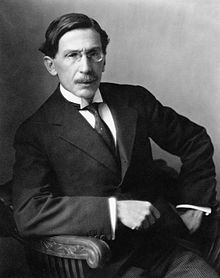- Manuel Díaz Rodríguez
-
Manuel Díaz Rodríguez 
144th Minister of Foreign Affairs of Venezuela In office
9 December 1913 – 22 October 1914President Juan Vicente Gómez Preceded by José Ladislao Andara Succeeded by Ignacio Andrade Personal details Born 28 February 1871
Caracas, VenezuelaDied 24 August 1927 (aged 56)
Caracas, VenezuelaSpouse(s) Graziella Calcaño Profession writer, diplomat, physician Religion Roman Catholic Signature 
Manuel Díaz Rodríguez (Chacao, Miranda state, 28 February 1871 - New York City, 24 August 1927), was a Venezuelan writer, journalist, physician, diplomat and politician, considered as one of the greatest representatives of the Hispanic modernismo movement.
Being born in Chacao, a small rural village near Caracas in the 19th century, were his parents were Juan Díaz Chávez and Dolores Rodríguez, canaries immigrants that arrived to Venezuela in 1842. In 1891 graduates as physician at the Central University of Venezuela. His literary vocation, begins in the mid 1890s, as cause of his travels to Europe (1892–1896), living in Paris and Vienna and occasional visits to Italy. On his return to Venezuela, joins the group of intellectuals who are grouped around the magazine El Cojo Ilustrado and "Cosmopolis", being one of the members of the so-called Generation of 1898 in Venezuela, next to Pedro Emilio Coll, Luis Manuel Urbaneja Achelpohl, Pedro César Dominici and César Zumeta. Publishing in 1896 Sensaciones de Viaje (Travel Sensations). This first book, includes an article previously published in El Cojo Ilustrado, Alrededor de Nápoes (Around Naples), in which expressed his modernist alienation.
In 1897 edited his Confidencias de psiquis (Psyche confidences), and in 1898 De mis romerías (From my pilgrimages), the last of his travel books cycle. For 1899, published in one volume his Cuentos de Color (Color tales), appeared first in El Cojo Ilustrado, the same year married in Caracas with Graziella Calcaño, traveling again to Paris. During this period, aparts of foreign topics, reflecting on his first novel, Ídolos Rotos (Broken Idols) (1901), the conflict of a person who returns to Venezuea from Europe, confusing Caracas with a rundown Florence.
In 1902 published his second novel Sangre patricia (Patrician blood), presenting the dislocation where the absentee died during his travel to modern coasts. After publishing this novel and followed by the death of his father, Diaz Rodríguez is responsible for the family hacienda, situated in the outskirts of Chacao. Between 1903 and 1908, divides his time between the farm work and literature. Finally ended his rural retirement with the publication of Camino de Perfección (Way of Perfection), where exposed his literary ideal, the perfection between the ideas and word. In 1909 directs the daily El Progresista, and is appointed as vice rector of the Central University of Venezuela. Was also director of Higher Education and Fine Arts at the Ministry of Education in 1911, Minister of Foreign Affairs between 1913 to 1914, Senator for the Bolívar state in 1915, Minister of Development in 1916, Minister Plenipotentiary of Venezuela in Italy from 1919 until 1923, Head of Government os the states Nueva Esparta (1925) and Sucre (1926). For 1921 published his last novel, Peregrina o el Pozo encantado (Pilgrim or the Enchanted well). In 1927, travels to New York City to treat a throat ailment, dying in that city at the age of 56, his last work was published after his death, entitled Entre colinas en flor (Among flowering hills).
Manuel Díaz Rodríguez, was member of the National Academy of History from 1926.
Bibliography
- “Sensaciones de Viajes” (1896)
- “Confesiones de Psiquis” (1897)
- “De mis romerías” (1898)
- “Cuentos de Color” (1899)
- “Ídolos Rotos” (1901)
- “Sangre Patricia” (1902)
- “Camino de Perfección” (1910)
- “Sermones líricos” (1918)
- “Peregrina o el Pozo encantado” (1922)
See also
- Venezuela
- Modernismo
- Literature of Venezuela
- List of Venezuelan writers
References
- (Spanish) Biography at Venezuelatuya.com
- (Spanish) Biography of the Mayorship of Chacao
- (Spanish) Biography by Pedro Díaz Seijas
Categories:- 1871 births
- 1927 deaths
- People from Miranda
- Venezuelan people of Spanish descent
- Venezuelan people of Canarian descent
- Venezuelan writers
- Venezuelan novelists
- Venezuelan journalists
- Venezuelan diplomats
- Venezuelan physicians
- Venezuelan Ministers of Foreign Affairs
- Central University of Venezuela alumni
- Modernismo
- Members of the Venezuelan Senate
- Government ministers of Venezuela
Wikimedia Foundation. 2010.
